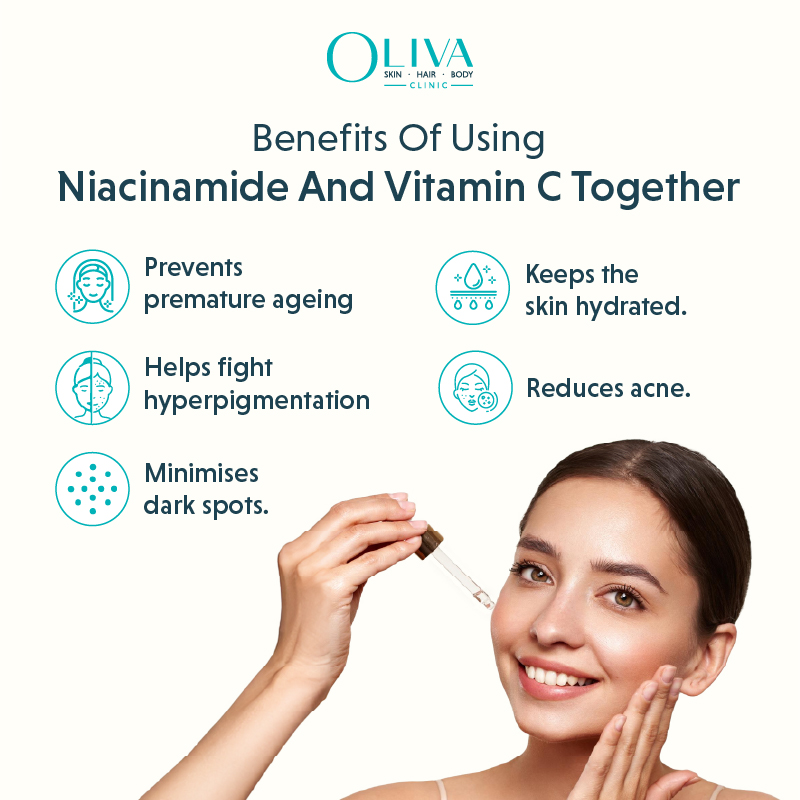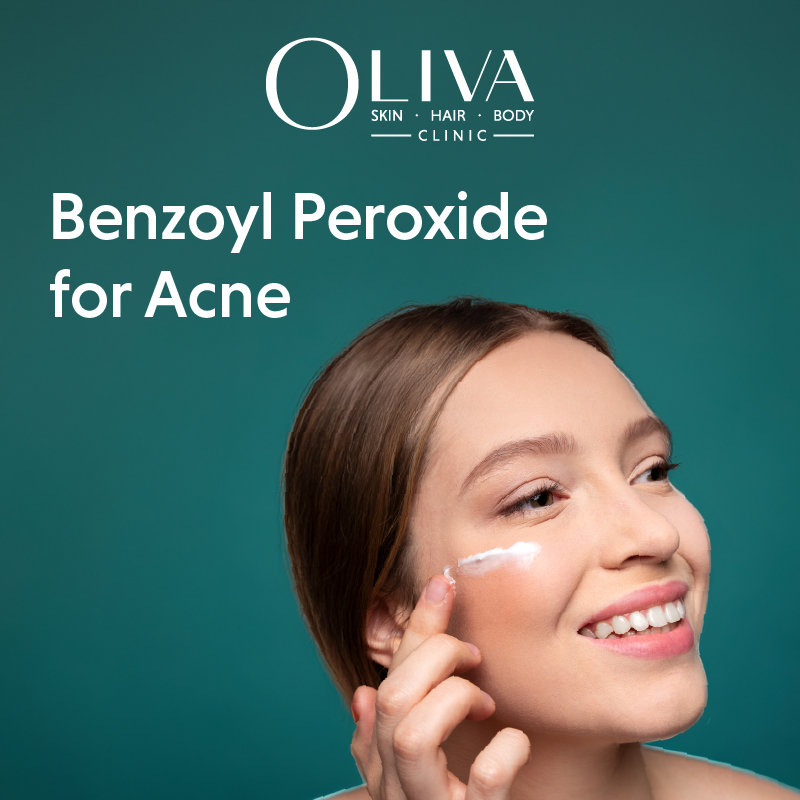How To Use Niacinamide And Vitamin C Together And Key Differences
Combining ingredients can be like playing a chemist when it comes to skincare. One question often arises: can we use Niacinamide and vitamin C together? Skincare experts advise the use of both these ingredients to resolve many concerns. Yet there are questions about their compatibility and ability to work in harmony, offering incredible benefits for the skin. This read explores whether Niacinamide and vitamin C can be used together, the benefits of this combination, and how to layer them and incorporate the duo into your skincare routine.
Table Of Content

Can You Use Niacinamide and Vitamin C Together?
Yes, you can use Niacinamide and vitamin C together. However, outdated research and myths surrounding these ingredients made many believe that vitamin C and Niacinamide might not work together.
However, contrary to this belief, combining these ingredients can help resolve various skin concerns.
Niacinamide, also known as vitamin B3, helps reduce inflammation in the skin. It also minimises pores and improves the texture of your skin. Vitamin C, on the other hand, is a potent antioxidant that brightens the skin, reduces hyperpigmentation and boosts collagen production.
When combined, they help boost each other’s effectiveness. Niacinamide helps to stabilise vitamin C, making it more effective and less irritating on the skin due to its inherent acidity. Vitamin C, on the other hand, boosts the effectiveness of Niacinamide, making it more effective in brightening the skin and reducing hyperpigmentation.
Using them together helps you tackle dullness, uneven skin tone, and fine lines, lending a more even-toned complexion.
Niacinamide Vs Vitamin C
Niacinamide and vitamin C are both superstars in the skincare world, each bringing unique benefits to your routine. Niacinamide, a form of vitamin B3, is excellent for calming the skin. It helps reduce redness, shrink pores, and improve texture, making your skin look smoother and healthier. Plus, it strengthens the skin barrier and locks the moisture, making it perfect for sensitive or acne-prone skin.
Vitamin C, on the other hand, is a brightening powerhouse. It is an antioxidant that helps fade dark spots, even out your skin tone, and boost collagen production, keeping your skin firm and youthful. It also protects against environmental damage from UV rays and pollution.
While Niacinamide is soothing and hydrating, vitamin C is excellent for brightening and fighting signs of ageing. Together, they can supercharge your skincare routine, leaving you with a glowing, even-toned, resilient complexion.
The Benefits Of Niacinamide
Here are some of the top benefits of Niacinamide for your skin [1]:
-
Manages Oiliness:
Niacinamide balances the sebum production in the skin, preventing it from becoming too oily and sticky. As a result, your skin is less prone to acne, blemishes, whiteheads and blackheads.
-
Reduces Irritation:
Niacinamide has anti-inflammatory properties that help to soothe irritated or inflamed skin. The more regularly you use it, the more evident the results become, especially for those suffering from skin conditions like eczema or rosacea.
-
Minimises Acne Breakouts:
Niacinamide is a non-oily anti-inflammatory application that is super effective in soothing acne. It also clears skin pores, reduces bacterial infection and controls further breakouts.
-
Builds Skin Immunity:
The regular use of Niacinamide boosts the production of the protein keratin. This protein makes the skin plump, firm, and healthy. It also controls free radical damage on the skin and reverses the signs of ageing.
-
Lends Skin Protection:
Niacinamide boosts elastin and ceramide production, strengthening the skin’s lipid barrier and retaining more moisture. It also facilitates the growth of healthier cells, protecting the skin from easy damage.
-
Reduces Pore Size:
Niacinamide clears out clogged and infected pores and helps shrink their size, making them less visible. This, in turn, enhances your skin texture and elasticity, lending it a smooth and supple look.
-
Evens Out Skin Tone:
It helps reduce dark spots and hyperpigmentation, lending you an even, blemish-free and clear skin tone.
-
Slows Down Skin Ageing:
Regular use of Niacinamide boosts ceramide, collagen, keratin, and elastin production in the skin, affecting the ageing process. Over time, you will see reduced fine lines, sagging skin and wrinkles.
-
Fights Dry Skin:
Niacinamide keeps skin hydrated and prevents moisture loss, preventing dry, flaky, and patchy skin from becoming excessively sensitive.
-
Boosts Skin Brightness
With anti-inflammatory benefits, ample hydration, elasticity, pore reduction, and fine line reduction, Niacinamide usage lends brightness and a flawless glow to the skin.
Niacinamide Compatibility With Various Skin Types
Niacinamide is highly versatile and works well with different skin types:
- Dry Skin: Niacinamide is best for strengthening the skin barrier. It helps retain moisture to fight dryness in your skin.
- Sensitive Skin: Sensitive and easily inflamed skin benefits from its soothing properties, as Niacinamide helps reduce redness, providing a calming effect without causing adverse reactions.
- Oily Skin: Niacinamide controls sebum production and reduces excess oil and shine.
- Acne-Prone Skin: Niacinamide minimises pore clogging and breakouts. Its anti-inflammatory effects also help to reduce the severity of acne and promote faster healing.
- Ageing Skin: Niacinamide boosts collagen production and improves skin elasticity, thus reducing fine lines and wrinkles. It also protects against environmental stressors, which is essential for maintaining youthful skin.
- Pigmented Skin: Niacinamide lightens your dark spots and hyperpigmentation. This results in a more even skin tone and also reduces the appearance of age spots and sun damage.
- Skin prone to Dark Circles: It can brighten the under-eye area by reducing pigmentation, helping to fade dark circles.
- Baggy Eyes: If you have puffy and baggy eyes, Niacinamide’s anti-inflammatory properties can help reduce the swelling, making your eyes look more rested and rejuvenated.
The Benefits Of Vitamin C For Skin
Here are some of the most common benefits of using vitamin C for skin [2]:
-
Safe and effective:
Vitamin C is safe and effective for most skin types for prolonged periods without fear of skin damage. Using a cream with 10% – 20% vitamin C concentration is ideal.
-
Hydration Benefits:
Vitamin C helps keep your skin adequately hydrated by maintaining its natural moisture barrier, giving it a plumpy and healthy look.
-
Reduces Inflammation:
If your skin has irritation or redness, vitamin C offers soothing benefits that calm it down, helping you feel more comfortable.
-
Brightens the Skin:
Say goodbye to dullness! Vitamin C brightens your complexion by fading dark spots, giving you a soft, supple and healthy glow. It also controls melanin production, which fights dark spots.
-
Protects from and Reduces Sun Damage:
Vitamin C is abundant in antioxidants that offer protection from harmful UV rays. It also helps heal sunburns much faster and slows down the ageing process caused by overexposure to the sun.
-
Anti-ageing Benefits:
Vitamin C boosts collagen production, helping keep skin firm and elastic and smoothing out fine lines and wrinkles.
-
Reduces Hyperpigmentation:
Do you have uneven skin tone? Vitamin C slows down melanin production, a pigment that causes dark spots, making your skin tone more even and radiant.
Compatibility With Various Skin Types
Vitamin C is versatile and can benefit various skin types. However, it is important to understand which type of vitamin C suits which skin type. [3]
Here is a breakdown:
- Normal to Oily Skin: It is best to use a product with L-ascorbic acid or ascorbyl palmitate, as they are both fast-acting and gentle at the same time.
- Sensitive Skin: Vitamin C products with ascorbyl palmitate or magnesium ascorbyl phosphate are safe to use on sensitive skin, as they are not irritating. It is best to skip L-ascorbic acid if you have sensitive skin, as it can be harsh.
- Dry Skin: Use products with magnesium ascorbyl phosphate if you have dry skin, as it helps keep the skin moist and hydrated. You can also try tetrahexyldecyl ascorbate products to see which one works best.
- Acne-Prone Skin: For skin that is easily prone to acne, products with sodium ascorbyl phosphate are advisable due to their anti-inflammatory properties that help put a check on fresh breakouts.
- Combination Skin: People with combination skin benefit the most from using L-ascorbic acid in the T-zone, as it helps reduce excessive oil buildup. For the comparatively drier areas, you can use ascorbyl palmitate.
- Ageing Skin: For skin fighting the signs of ageing and uneven skin tone, it is best to go for a product with tetrahexyldecyl ascorbate as a wide-spectrum remedy. Its repairing properties help replenish the lost health of your skin.
The Benefits Of Using Niacinamide And Vitamin C Together
There are several benefits of using Niacinamide and vitamin C together. Here are some of them mentioned below:
- When you use Niacinamide and vitamin C together, you get enhanced antioxidant benefits that protect your skin from damage caused by free radicals. This prevents premature ageing and sun damage.
- This combination helps fight hyperpigmentation, sun spots, dark spots and patchy skin.
- Using Niacinamide and vitamin C together helps keep your skin hydrated, plump and supple.
- Both products lend anti-inflammatory benefits that soothe redness and irritation on the skin.
- They work together to reduce pore size, oiliness, and acne from the skin.
How To Layer Niacinamide And Vitamin C?
Layering is the best way to use Niacinamide and vitamin C together. To layer these two products, use a toner first to help balance the pH of your face. After that, apply the Vitamin C product of your choice, as vitamin C absorbs best at a lower pH. [4] Follow it up with Niacinamide, which is effective at higher pH levels. It is also good to remember that you must apply these products from the thinnest consistency first to the thickest consistency to ensure maximum absorption.
How To Use Niacinamide And Vitamin C In Your Skincare Routine?
To use Niacinamide and vitamin C, do a patch test first to confirm product suitability. It is best to use Niacinamide products in the morning, while you can also use vitamin C-rich products in the morning and at night. In the morning, they help reduce oxidative stress caused by environmental factors, and at night, they replenish skin health and repair damage.
Takeaway
Niacinamide and vitamin C are skincare powerhouses that cater to diverse skin needs. Niacinamide soothes and strengthens, making it perfect for sensitive and ageing skin. Meanwhile, vitamin C brightens and protects, benefiting all skin types. Apply vitamin C first in your morning routine, followed by Niacinamide for best results. Integrate both into your skincare regimen to achieve radiant and balanced skin effortlessly.
Frequently Asked Questions
There is no need to wait between vitamin C and Niacinamide. It is absolutely safe to use them together.
Niacinamide mixes well with most ingredients; however, to avoid skin irritation, do not mix it with acidic products like AHAs.
Using Vitamin C first and Niacinamide later is ideal for the best results.
Niacinamide is versatile, and you can use it at any time of the day. It blends with most skincare routines.
If you stop using Niacinamide, you will lose any benefits that you gain from its regular use over time, and your skin will revert to its previous state.
Both products are effective for skin lightening and whitening benefits. Niacinamide helps lighten dark spots and hyperpigmentation gradually over time, while vitamin C works more directly on reducing existing pigmentation and preventing new spots from forming.








